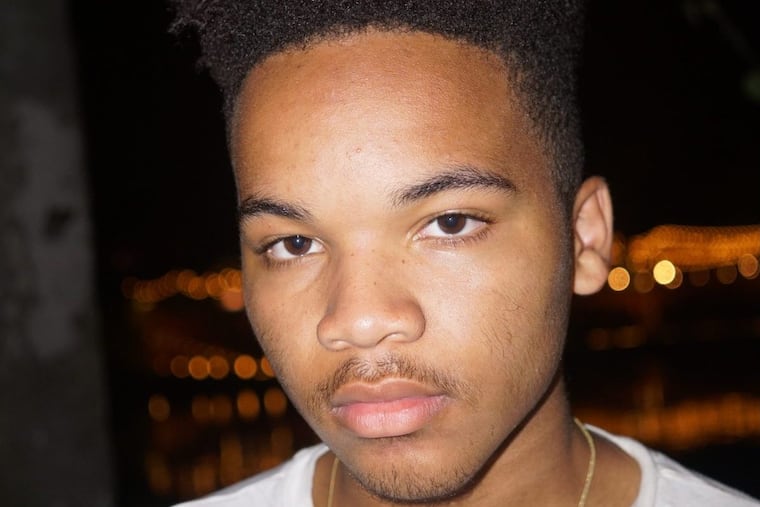Science Leadership Academy’s Wes Matthews is new Philadelphia youth poet laureate
The city's new youth poet laureate is Wes Matthews, a senior at Science Leadership Academy. He will serve for a year and be mentored by the present poet laureate, Raquel Salas Rivera.

This is a big week for Wes Matthews, 17, of Science Leadership Academy. Monday was his first day as a senior. And Tuesday he will become the Philadelphia Youth Poet for 2018-2019.
He is scheduled to receive the honor at a ceremony at 6 p.m. Tuesday in the lobby of the Central Library of the Free Library of Philadelphia, when he will also give his inaugural reading. "To be given a platform for people my age who care about poetry and what it does, it's very humbling," Matthews said by phone. "This is just the first step. There's more work to be done. I have a sense of responsibility to the city."
Matthews, a two-time Brave New Voices competitor, was also a speaker at the 2016 TEDx in his original hometown of Detroit.
A winner of the 2018 Philly Slam League All-Star Poetry Slam, he has published in the Detroit Free Press, Eunoia Review, Dreginald Magazine, and elsewhere. He is the city's sixth youth poet laureate, succeeding Siduri Beckman (2013-14), Soledad Alfaro-Allah (2014-15), David Jones (2015-16), Otter Jung-Allen (2016-17), and Husnaa Hashim (2017-18). Begun in 2012, the adult and youth poet laureate programs were at first administered by the city but have now found a permanent home at the Center for Public Life at the Free Library.
Beth Feldman Brandt, executive director of the poet laureate governing committee, says that there are a lot of budding poets out there. "Every year," she says, "to see this huge range of young voices amazes us." In this bright crowd, Matthews was a standout, Brandt said, in both his poetry and his vision of the youth laureate position.
"We were all impressed by the complexity of his poems," Brandt said, "how he makes connections, how he even creates new words to get new meanings, which I love."
Raquel Salas Rivera, the present adult poet laureate, will mentor Matthews during his tenure. "Wes has an incredible voice that is very mature, a voice that is very already developed," Rivera said. "It's layered, it's dense. He sounds like an adult poet who has been working for a while."
You can sense that maturity when he writes in "Ode to Vultures":
who have nothing but their own pulse to make them men, & by pulse I mean
the neckstrain & drag force visible when someone openeyed dies, their inglorious
shoulderblades becoming inverted land toppling itself down to the sand & nothingness.
Asked what his most recent poem was about, Matthews gives an answer full of that same sense that he's seen a lot: "I've been thinking about the spectacle of black life in America. There's an ironic dichotomy there, in the way black culture is so often uplifted and praised, yet black humanhood is degraded."
"He's very clear in terms of how he views his own work," says Rivera, "and how he sees himself involved in poetry as a form of public outreach. And he's very committed to the city."
Many towns and cities have poets laureate, but Philadelphia's program is unusual in the degree to which honorees work in the community. Like the adult poet laureate, the youth poet laureate is expected to design a community service project and to bring poetry in meaningful, creative ways into the neighborhoods. To hear him talk, you'd have to say Matthews is a natural fit.
"I also have a strong interest in social issues," he says. "Something that recurs in my writing is prison reform, the school-to-prison-pipeline. That's what people don't realize sometimes: Prison reform and education reform are closely connected. I'm hoping I can bring poetry to both spaces."
On the literary side, Matthews says, "I'm thinking about planning a workshop series, and a reading series, inviting well-known readers to come and meet young writers so they feel connected."
Matthews credits his mother, a writer and teacher, for teaching him the pleasures and power of verse. "I started writing in imitation of her," he says. "I enjoyed the expression, and I also liked the way it combined a lot of the things I like a lot. I was always interested in the sonics of language, the way words sound, and how language creates rhythms."
He says he's looking forward to working with Rivera, whose poetry, he says, "has a strong sense of place and people. I like that, and I want my poetry also to be deeply personal and incorporate the things I've always been passionate about. I'm looking forward to working with all the new people I'm going to meet."